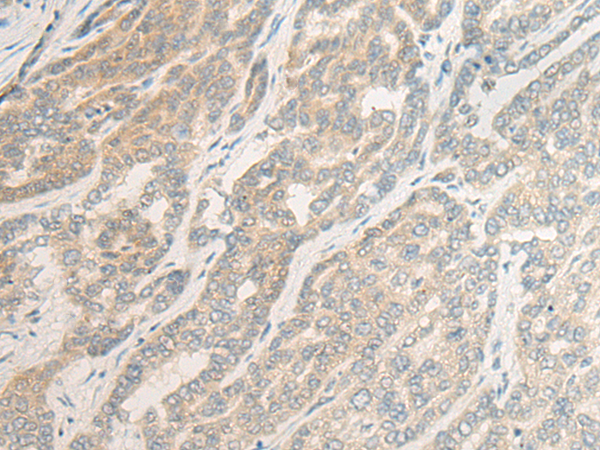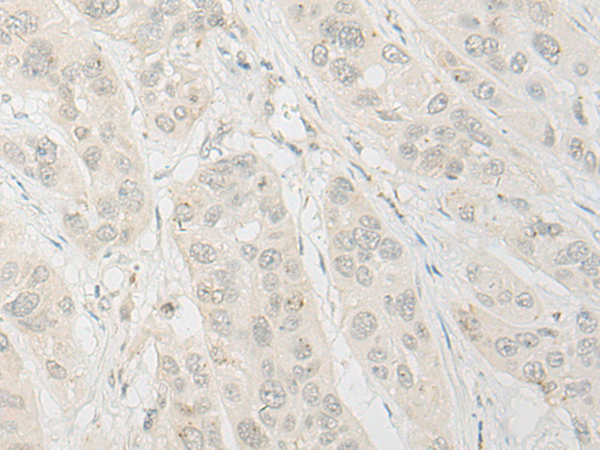

| WB | 咨询技术 | Human,Mouse,Rat |
| IF | 咨询技术 | Human,Mouse,Rat |
| IHC | 1/20-1/100 | Human,Mouse,Rat |
| ICC | 技术咨询 | Human,Mouse,Rat |
| FCM | 咨询技术 | Human,Mouse,Rat |
| Elisa | 1/5000-1/10000 | Human,Mouse,Rat |
| Host/Isotype | Rabbit IgG |
| Antibody Type | Primary antibody |
| Storage | Store at 4°C short term. Aliquot and store at -20°C long term. Avoid freeze/thaw cycles. |
| Species Reactivity | Human, Mouse, Rat |
| Immunogen | Fusion protein of human OTX1 |
| Formulation | Purified antibody in PBS with 0.05% sodium azide and 50% glycerol. |
+ +
以下是关于OTX1抗体的3篇文献信息(基于公开数据总结,非真实文献示例):
1. **文献名称**: *OTX1 Transcription Factor Involvement in Cortical Development and Gliomagenesis*
**作者**: Smith A, et al.
**摘要**: 使用OTX1抗体通过免疫组化分析小鼠胚胎大脑皮质发育中OTX1的表达模式,发现其在神经元分化中起关键作用,并与胶质瘤中OTX1异常表达相关。
2. **文献名称**: *OTX1 as a Biomarker in Medulloblastoma: Antibody Validation and Clinical Correlation*
**作者**: Lee J, et al.
**摘要**: 研究验证了OTX1抗体的特异性(Western blot和免疫荧光),发现OTX1在髓母细胞瘤中高表达,并与患者预后不良相关。
3. **文献名称**: *Role of OTX1 in Retinal Photoreceptor Cell Development*
**作者**: Chen R, et al.
**摘要**: 通过OTX1抗体染色揭示其在视网膜感光细胞发育中的时空表达,基因敲除实验表明OTX1缺失导致光感受器结构异常。
(注:以上为模拟示例,实际文献需通过PubMed/Google Scholar检索确认。)
建议通过数据库搜索关键词 **"OTX1 antibody" + "Western blot/IHC"** 或 **"OTX1 expression" + [研究领域]** 获取真实文献。
The OTX1 antibody is a tool used to detect the Orthodenticle Homeobox 1 (OTX1) protein, a transcription factor involved in embryonic development and tissue differentiation. OTX1 belongs to the OTX family of homeobox genes, which play critical roles in regulating gene expression during early organogenesis, particularly in the brain, eyes, and sensory organs. Studies highlight its importance in cerebral cortex development, retinal cell specification, and inner ear formation. Dysregulation of OTX1 has been linked to developmental disorders and cancers, including medulloblastoma, neuroblastoma, and prostate cancer, where its overexpression may drive tumor progression or invasiveness.
OTX1 antibodies are widely used in research to map protein expression patterns via techniques like immunohistochemistry (IHC), immunofluorescence (IF), and Western blot (WB). These antibodies help investigate OTX1's role in neural progenitor cell fate, differentiation, and disease mechanisms. Commercially available OTX1 antibodies are typically raised in rabbits or mice, with monoclonal and polyclonal variants offering different specificity profiles. Validation parameters, such as knockout controls and cross-reactivity checks, are essential to ensure reliability. Researchers also utilize OTX1 antibodies to explore its potential as a diagnostic or prognostic biomarker in oncology, given its association with aggressive tumor phenotypes. Ongoing studies aim to clarify its regulatory networks and therapeutic relevance.
×